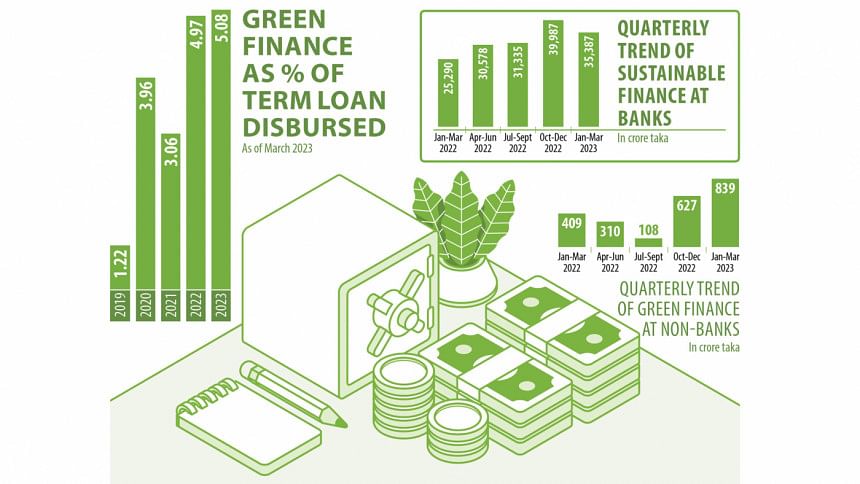Sustainable finance on the rise

Sustainable finance extended by banks rose nearly 40 percent year-on-year to Tk 35,387 crore in the first quarter of 2023 as lenders keep disbursing a higher volume of loans to eco-friendly businesses and industries, official figures showed.
The amount stood at Tk 25,290 crore in the identical January-March quarter of 2022, according to the Quarterly Review Report on Sustainable Finance of Banks & Financial Institutions of the Bangladesh Bank.
The disbursement in the first quarter of 2023 was slightly down from Tk 39,987 crore lent in the October-December quarter.
The BB introduced green banking activities in 2009 and issued guidelines on green banking in 2011. It rolled out the sustainable finance policy in 2020.
The central bank defines sustainable finance as any form of financial service that includes investment, insurance, banking, accounting, trading, economic and financial advice integrating environmental, social and governance criteria into business or investment decisions for lasting benefits of both clients and society.
It includes green finance, sustainable agriculture, sustainable cottage, micro, small and medium enterprises, socially responsible financing, working capital and demand loan of green products, projects and initiatives, and priority green or eco-friendly products in the trading sector.
Green finance of banks surged 65 percent year-on-year to Tk 2,775 crore in the first quarter of 2023. This, however, was down from Tk 4,050 crore reported in the October-December quarter.
The amount totalled Tk 1,689 crore in the January-March quarter of 2022.
Green credits disbursed by non-bank financial institutions (NBFIs) more than doubled to Tk 839 crore in January-March this year compared to Tk 409 crore a year earlier.
In 2022, banks and non-banks disbursed Tk 12,226 crore in the form of green finance, up from Tk 7,232 crore in 2021.
In Bangladesh, green finance as a percentage of the total term loan given out more than quadrupled from 1.22 percent in 2019 to 4.97 percent in 2022. It rose further to 5.08 percent in the January-March quarter of 2023.
Similarly, sustainable finance rose to Tk 130,762 crore from Tk 82,551 crore in 2021. Such funding accounted for 8.04 percent of the total loans in 2021, 11.59 percent in 2022 and 13.77 percent in the first quarter of 2023.
According to the report, 56 banks out of 61 and 13 NBFIs out of 34 had exposure in sustainable finance in the first quarter.
Rajshahi Krishi Unnayan Bank topped the chart among the banks when it comes to sustainable financing. Its attainment stood at 64.57 percent, followed by Bangladesh Krishi Bank's 56.42 percent, Shahjalal Islami Bank's 39.81 percent and National Bank's 35 percent.
Bangladesh Infrastructure Finance Fund, Infrastructure Development Company and UAE-Bangladesh Investment Company all hit the target among the NBFIs.
Forty-two banks and nine NBFIs had exposure in green finance in the January-March quarter.
Exim Bank, Shahjalal Islami Bank and Shimanto Bank were the top three banks in green finance in the three-month period while Bangladesh Infrastructure Finance Fund and Infrastructure Development Company achieved the goal set by the BB.
In January-March, 19 banks and eight NBFIs surpassed the target of green finance, which was set at 5 percent compared to the total term loan disbursement.
The banks were Exim, Shahjalal Islami, Shimanto, State Bank of India, United Commercial, Islami Bank Bangladesh, Jamuna, Trust, Prime, Modhumoti, Mutual Trust, Janata, HSBC, Uttara, City, Social Islami, Eastern, Brac, and Bank Asia.
The NBFIs were Bangladesh Infrastructure Finance Fund, Infrastructure Development Company, UAE-Bangladesh Investment Company, Bangladesh Finance & Investment, CVC Finance, United Finance, Agrani SME Financing, and IDLC Finance.
Besides, 15 banks and 10 NBFIs managed to fulfil their target of sustainable finance compared to the total loan disbursement.
In the report, the central bank said in an emerging economy like Bangladesh, environmental management needs to be the key focus area of the business fraternity, especially the banking industry, which is a major intermediary.
"Green and sustainable interventions and frameworks are crucial for making future development more sustainable. Forming sustainable frameworks is very much within the broader scope of sustainable development agenda of a country like Bangladesh."
It said banks and NBFIs hold a unique position in an economic system that can affect production, business and other economic activities through their financing activities and influence environmental risk management in real economy and sustainable growth.
"These institutions can accelerate the movement of a clean world to a large extent."

 For all latest news, follow The Daily Star's Google News channel.
For all latest news, follow The Daily Star's Google News channel. 








Comments